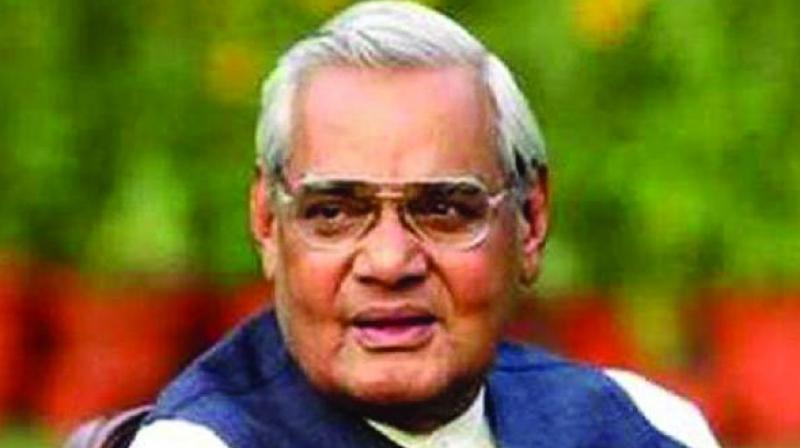Atal Behari Vajpayee (1924-2018): A liberal' pragmatist & last of the Nehruvians

He would not have seen it as ironical, but to most other people, including those from the BJP circa 2018, and to many in the Congress who barely remember Jawaharlal Nehru, it would sound odd that Atal Behari Vajpayee’s death marks the snapping of the last ties with the Nehruvian era. It marks the end of an epoch in more than a clichéd sense. Indira Gandhi and others might have been close to Nehru in other ways, but Vajpayee encountered Nehru in the political arena, in the Lok Sabha, criticised him, wrote letters to him about India’s China policy and received replies from Nehru. Vajpayee recalled in 1996 when he moved the confidence motion for his 13-day government that Nehru walked up to him at a state banquet after a critical speech he (Vajpayee) had made in the House, praised it and walked away. Vajpayee said if he were to criticise a person the way he criticised Nehru, that person would stop talking to him. This was Vajpayee speaking in 1996. It should be a matter of wonderment as to what he would have said in 2018.
What marked out Vajpayee, the politician in a right-wing party, in the Jan Sangh till 1977, and in BJP from 1980 onward? Many called him a liberal in a right-wing party, or the right man in the wrong party. But Vajpayee never seemed to have second thoughts about the BJS/BJP ideology, with its roots in the notion of the Hindu-ness of Indian civilisation. Though he remained a member of the Rashtriya Swayamsevak Sangh, the parent body of the Jan Sangh and the BJP, he did not allow himself to be stifled within the narrow confines of Hindutva. It was a difficult balancing act to do, and he did it well. So, was he a right-winger or a liberal? Of course, there was never any question of him being a leftist of any kind.
Though he coined “Gandhian Socialism” as the BJP’s creed at the time of its birth, it’s not very clear whether he really believed in it or not. There was no intellectual dishonesty about the man. He knew the compulsions and possibilities of politics, and he almost flowed with the tide, as it were. In his outlook, he was more under the spell of Nehru than of Gandhi. Deen Dayal Upadhyay showed traces of Gandhian thought, but Vajpayee never tilted that way. He believed in modernisation, in technology and economic growth. He believed in the advantages of a free market without making himself out to be a doctrinaire free marketeer.
He was a pragmatist more than anything else, and he was able to create the National Democratic Alliance because the other regional and socialist parties like the DMK of the late M. Karunanidhi and the Janata Dal of George Fernandes joined hands with him. He pulled the BJP out if its political isolation of 1996 when it was an “untouchable” to the point when it became a leader of a coalition of over 20 parties from every part of the country. In more ways than one, he mainstreamed the BJP, and also made it a party of governance.
When P.V. Narasimha Rao seemed to be at sea in a post-ideological world after the Soviet Union’s fall and the end of the Cold War in 1991, Vajpayee steered India and strategically positioned it in a world moving towards a new balance of power. He never overstressed the right-wing ideology of the RSS, and made the BJP a party of good governance which pursued economic growth through tactical moves.
When he carried out the Pokhran nuclear tests in May 1998, he didn’t indulge in sabre-rattling as did many immature party colleagues, but used it carefully to strategically position India in the world. The India-US civil nuclear deal is an outcome of the May 1998 nuclear tests. But there was no note of war-mongering except when he talked of “aar-paar ki ladaai” after the terrorist attack on Parliament in December 2001. But it was the same man who travelled to Islamabad in January 2004 for the Saarc summit, and managed to get then Pakistan President Pervez Musharraf to concede that Pakistan’s territory would not be used for terrorism against India in a joint statement.
The interesting aspect of Vajpayee’s politics is that he did not find it necessary to renounce or denounce his right-wing roots in the RSS and did not find it necessary to declare his conversion to liberalism. He pursued Nehruvian liberalism with a pragmatic touch, which meant strengthening India’s strategic position. There was no better way of securing the country’s national interests.
He is the only Jan Sangh/BJP leader who didn’t feel the need to denounce Nehru without becoming a Nehru acolyte. He walked his own path, taking what he needed to from a political leader like Nehru. The one thing that interested the two was international affairs, each for their own reason. Nehru was a cosmopolitan, Vajpayee was not. Vajpayee remained rooted to his local Indian roots and was quite comfortable with it.
For many Vajpayee will remain a paradox. A right-wing politician who didn’t flaunt his right-wing ideology more than it was needed, and who on the whole handled things in a pragmatic sense. He followed the liberal path without being a liberal. It isn’t his fault that many mistook him for a liberal, and many others criticised him for being a liberal. Vajpayee is a Nehruvian in the sense that Nehru too was not a socialist even when he seemed to be following socialist policies. Vajpayee once described Nehru as a complex personality, who combined Churchill and Chamberlain in himself. Vajpayee too is a complex personality who combined Hindu conservatism with liberal pragmatism. Nehru and Vajpayee are the true representatives of a complex and ancient civilisation like India.
H10

